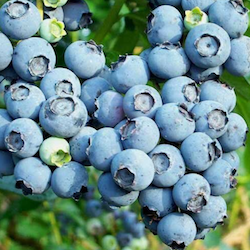 Image 1 of
Image 1 of


Blueberry 'Powder Blue'
Rabbiteye variety – crops late January to mid-March
INFO ON BLUEBERRIES
1. There are two types of Blueberries, rabbiteye and highbush.
2. Position in full sun and in a well-drained site. If necessary raise the planting bed up to improve drainage.
3. Adding peat or pine needles will help to make the soil ‘acid’ which Blueberries thrive in.
4. Keep well-watered, particularly during the fruiting period.
5. Mulching helps enormously with moisture retention and improvement of organic matter.
6. Blueberries generally grow to around 1.8m high, they are thornless and don’t suffer from pests or diseases which means that no spraying is necessary.
Rabbiteye varieties will not tolerate very hard frosts (below -5C) and more than one variety is necessary for successful cropping. Less fussy about soil-type.
· Centurion – crops February to April
· Powder Blue – crops late January to mid-March
· Rahi – crops February
· Tifblue – crops January
Rabbiteye variety – crops late January to mid-March
INFO ON BLUEBERRIES
1. There are two types of Blueberries, rabbiteye and highbush.
2. Position in full sun and in a well-drained site. If necessary raise the planting bed up to improve drainage.
3. Adding peat or pine needles will help to make the soil ‘acid’ which Blueberries thrive in.
4. Keep well-watered, particularly during the fruiting period.
5. Mulching helps enormously with moisture retention and improvement of organic matter.
6. Blueberries generally grow to around 1.8m high, they are thornless and don’t suffer from pests or diseases which means that no spraying is necessary.
Rabbiteye varieties will not tolerate very hard frosts (below -5C) and more than one variety is necessary for successful cropping. Less fussy about soil-type.
· Centurion – crops February to April
· Powder Blue – crops late January to mid-March
· Rahi – crops February
· Tifblue – crops January
Rabbiteye variety – crops late January to mid-March
INFO ON BLUEBERRIES
1. There are two types of Blueberries, rabbiteye and highbush.
2. Position in full sun and in a well-drained site. If necessary raise the planting bed up to improve drainage.
3. Adding peat or pine needles will help to make the soil ‘acid’ which Blueberries thrive in.
4. Keep well-watered, particularly during the fruiting period.
5. Mulching helps enormously with moisture retention and improvement of organic matter.
6. Blueberries generally grow to around 1.8m high, they are thornless and don’t suffer from pests or diseases which means that no spraying is necessary.
Rabbiteye varieties will not tolerate very hard frosts (below -5C) and more than one variety is necessary for successful cropping. Less fussy about soil-type.
· Centurion – crops February to April
· Powder Blue – crops late January to mid-March
· Rahi – crops February
· Tifblue – crops January


